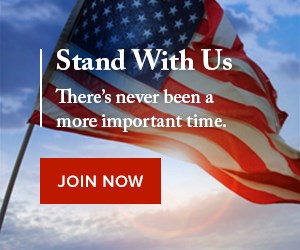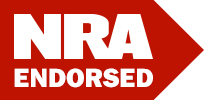A recent U.S. Supreme Court decision marks a resounding victory for the Constitution, for freedom of speech and for every member of the National Rifle Association-a victory that was possible only because NRA members never stopped fighting.
In January, the Supreme Court decided the case of Citizens United v. Federal Election Commission, involving a challenge to part of the federal campaign speech restriction law referred to as McCain-Feingold for the names of its sponsors. By a 5-4 vote, the court declared unconstitutional the parts of the law that had been enacted for the explicit purpose of silencing the National Rifle Association and its members.
The five justices who voted to uphold the First Amendment in Citizens United were the same five who voted to uphold the Second Amendment in District of Columbia v. Heller. Thanks to those pro-Constitution justices-and to NRA members who worked hard to elect the presidents who appointed those justices-your rights as an NRA member to speak out in public during elections have been restored.
"This victory is a big validation of all the efforts NRA has put into demanding equal access to the First Amendment for its members," NRA Executive Vice President Wayne LaPierre said. "No longer does American law make NRA members second-class citizens when it comes to the right to free speech."
Chris W. Cox, executive director of the NRA Institute for Legislative Action, agreed.
"This decision returns sanity to our political system," Cox said. "The First Amendment does not allow Congress to make laws denying Americans the right to speak out on issues, the right to assemble or organize on public policy issues or the right to petition our government for redress of grievances."
At issue in Citizens United was a section of the law that outlawed corporate and union speech during political campaigns. (The law is section 441b of Title 2 of the United States Code.) Justice Anthony Kennedy`s majority opinion in Citizens United explained the effect of this law:
"Thus, the following acts would all be felonies under § 441b: ... the National Rifle Association publishes a book urging the public to vote for the challenger because the incumbent U.S. senator supports a handgun ban; and the American Civil Liberties Union creates a website telling the public to vote for a presidential candidate in light of that candidate`s defense of free speech. These prohibitions are classic examples of censorship."
As Justice Kennedy observed, the law`s "purpose and effect are to silence entities whose voices the government deems to be suspect."
The National Rifle Association is a corporation, as are almost all civil rights organizations. So when corporate speech was outlawed, the speech of the NRA-indeed, your free speech-was outlawed. How did the land of the free ever get into a position where leaders of civil rights groups could be sent to prison for publishing books or creating websites about political candidates?
Way back in 1907, Congress enacted the first version of section 441b, known as the Tillman Act for its sponsor "Pitchfork" Ben Tillman. This act made it unlawful for any corporation to contribute to a federal election campaign.
Sen. Tillman was one of the most vicious racists ever to disgrace the U.S. Senate. During Reconstruction, Tillman was a member of terrorist organizations that used violence to thwart enforcement of the constitutional rights of the black and white citizens of South Carolina.
Throughout his career, Tillman was the best friend of enemies of the Constitution. He was ardently pro-lynching. As governor of South Carolina before entering the Senate, he disenfranchised the state`s black population.
Currently, the Supreme Court is considering the case of McDonald v. Chicago, which challenges the Chicago handgun ban. Chicago takes the same position as "Pitchfork" Tillman: State and local governments should not have to obey any part of the Bill of Rights. The National Rifle Association, as a party in the case, takes the opposite position: The 14th Amendment was enacted for the precise purpose of making oppressive governments (Tillman`s South Carolina or Richard Daley`s Chicago) respect the Bill of Rights, especially the Second Amendment.
In 1947, Congress voted to expand the Tillman Act so that it also applied to unions, and so that it prohibited independent expenditures as well as direct contributions. President Harry Truman (who happened to be a great admirer of the NRA for its service to the nation during World War II) vetoed the bill. The president`s veto message warned, "The bill would prohibit many legitimate activities on the part of unions and corporations. This provision would prevent the ordinary union newspaper from commenting favorably or unfavorably upon candidates or issues in national elections. I regard this as a dangerous intrusion on free speech, unwarranted by any demonstration of need. ..."
Unfortunately, the speech restriction was part of a broader bill on labor relations, the Taft-Hartley Act, and Congress passed the act over the president`s veto.
The Taft-Hartley Act was interpreted narrowly, so that it only applied to "express advocacy." As long as a communication did not use "magic words" such as "vote for" or "defeat," it was still allowed.
The censorship lobby, however, was not satisfied and state restrictions on independent expenditures by civil rights organizations and other corporations began to grow in the 1980s. The first Supreme Court case upholding censorship of independent expenditures was the 1990 decision Austin v. Michigan Chamber of Commerce. Restrictions on all independent expenditures for federal campaigns became quite severe with the 2002 enactment of the even broader speech ban contested in Citizens United.
Massachusetts Rep. Marty Meehan declared that the law would "cut the ties between gun money and Congress once and for all" and would lead to "passing real gun control legislation."
Meehan complained indignantly that, "The National Rifle Association and other groups spent millions over the years trying to defeat" anti-gun Oklahoma Rep. Mike Synar. Partly because of NRA independent expenditures, eight-term incumbent Synar was narrowly defeated in the 1994 Democratic primary by a first-time candidate.
Pro-Constitution Rep. Chip Pickering, R-Miss., pointed out the motives behind the censorship agenda. On the floor of Congress, Rep. Pickering quoted the words of Scott Harshbarger, the president of Common Cause, which was the prime lobbying group for new speech restrictions. According to Harshbarger, "We need to make the connection with every person who cares about gun control that there is a need for campaign finance reform because that is how you are going to break their power."
When the new law was enacted in 2002, it was filled with loopholes designed to benefit the gun-ban lobby. The bill banned independent political expenditures by corporations (e.g., the NRA) and unions. But there was a loophole for media corporations-so The New York Times, CBS and the rest of the anti-gun "mainstream" media could continue to spend all the money they wanted on propagandizing for anti-gun candidates like John Kerry.
Another loophole allowed unlimited spending by a special type of corporation known as a "527" (for the section in the tax code that defines these corporations). These 527 corporations were the vehicle for George Soros and his coterie of extremist anti-gun billionaires to spend tens of millions of dollars trying to buy the 2004 election for John Kerry.
The NRA counterattack began immediately. At the NRA Annual Meetings, LaPierre defied the censors and boldly announced that the NRA had just as much right to call itself a news organization as CBS or CNN. A few months later, NRANews went on the air, broadcasting three hours a day on satellite radio and the Internet. The Washington Post complained about the NRA`s "circumvention" of the censorship laws.
Actually, NRANews has proven itself to be just as good as-in fact, better than-its old media competitors. NRANews has an outstanding record of factual accuracy about gun issues, which is more than can be said for MSNBC and most of the traditional media. Of course, NRANews has a strong point of view on gun policy-but so does most of the rest of the media. NRANews just happens to have a pro-freedom view.
The NRA took a lead role in the first challenge to the speech ban, the case of McConnell v. Federal Election Commission. The defenders of the law said that the censorship was all right because the NRA was still allowed a different way to participate in elections: While the federal election laws forbade the NRA from using its own money for independent expenditures during elections, the law did allow the association to use a separate legal entity, the NRA Political Victory Fund (NRA-PVF), which could solicit money from NRA members and spend it on elections.
Under federal election law, NRA-PVF is a type of Political Action Committee (PAC). However, the PAC mandate meant that many gun owners were shut out of the election process.
|
As the NRA explained in its Supreme Court brief in McConnell, the congressional supporters of the speech ban "well understood that requiring the NRA to speak through its PAC will necessarily reduce the collective voice of its 4 million members to a whisper. A battery of regulatory and practical hurdles precludes groups such as the NRA from using their PACs to make independent expenditures commensurate with public support for their political ideas. The NRA`s PAC, the PVF, is strictly barred from soliciting beyond the NRA`s membership for contributions, and no portion of an NRA member`s membership fees may be allocated to PVF." The amount that the NRA could spend on the elections, via the Political Victory Fund, was only about 6 percent as much as total annual contributions to the NRA. Judge Karen LeCraft Henderson explained, "The disparity stems from the inability of NRA members-most of whom are individuals of modest means-to pay the NRA`s membership fee and then contribute beyond that amount to NRA-PVF." (Judge Henderson of the D.C. Circuit Court of Appeals was writing in the McConnell case, before it reached the Supreme Court). So as the NRA told the Supreme Court, the law "effectively deprives millions of ordinary individuals of their ability to join collectively in making `electioneering communications` to support and preserve their freedoms under the Second Amendment." The censorship law also meant that the NRA website, including the blogs hosted there, were legally forbidden from expressly advocating the election or defeat of a federal candidate. The law made it illegal for the NRA itself to mention the name of a federal candidate in some public communications 60 days before the general election, or 30 days before a primary. The ban not only prevented election communications, it also prevented many other necessary communications. As the NRA`s amicus brief in McConnell explained: "An issue advocacy organization typically names federal officeholders and candidates for innumerable reasons, ranging from the need to educate the public about threats to the groups` beliefs, to defending itself against direct attacks launched by the politicians themselves. ... And, as Judge Henderson found, when the NRA`s speech is properly taken into account, more than a third of the broadcasts that Title 2 [part of the 2002 law] would have criminalized in the 2000 cycle were genuine issue ads unrelated to a federal election." The McConnell challenge was defeated 5-4, but it laid the foundation for the later victory in Citizens United. First of all, the McConnell case laid out the full factual record about the law-including the deliberate intention to shut down voices that dared to criticize congressional incumbents. In the Citizens United case, the Supreme Court was able to use the detailed factual record-over 100,000 pages long-from McConnell, rather than having to send the case back to trial court for fact finding, a process that would have left the censorship laws in effect for the 2010 election. Second, McConnell left open the possibility for further challenges to campaign laws, based on a particular speaker`s situation. Some of these challenges were successful, and provided a little more breathing room for free speech. Then came Citizens United. During the 2008 primary elections, the advocacy group Citizens United wanted to pay for the cable television airing of a documentary it had produced about Sen. Hillary Clinton. The Federal Election Commission refused to allow the documentary, which was very critical of Clinton, to be shown on television. Anti-gun members of Congress proudly announced the law`s
objective of censoring the NRA. Illinois Rep. Jan Schakowsky
promised that the new law would help pass gun control, because the
speech restrictions would mean, "the NRA does not call As matter of statutory interpretation, the Obama administration was correct. The law did indeed allow for unlimited censorship. The argument highlighted what the NRA had been saying all along: The 2002 law was a bait and switch. Promoted as a tool to reduce negative television commercials, it was by far the worst, most extensive federal censorship law in American history. It was becoming clear that Americans could have a strong First Amendment, or they could have the 2002 speech ban, but they could not have both. So the Supreme Court scheduled a September 2009 re-argument on a broader question: should the Supreme Court overrule the 1990 case of Austin v. Michigan Chamber of Commerce and part of the 2003 McConnell case? It was these cases that said the speech of corporations and unions could be subject to special censorship laws. Once again, the NRA participated in the case, filing an amicus brief that urged that the censorship law be struck down. Finally, in January 2010, the Supreme Court ruled in Citizens United and tore the heart out of the 2002 law: Corporations and unions may not be subjected to special speech restrictions during campaigns. LaPierre called Citizens United "a validation of everything the NRA has fought for." Simply put, if John Kerry had won the 2004 election-and he would have won if not for all the hard work of NRA activists-he almost certainly would have appointed Supreme Court justices who would have turned Citizens United into a 6-3 win for censorship, instead of a 5-4 win for the First Amendment. Because of the NRA, the following words from Justice Kennedy came in the majority opinion, rather than in the dissent: "If the First Amendment has any force, it prohibits Congress from fining or jailing citizens, or associations of citizens, for simply engaging in political speech." So, "when government seeks to use its full power, including the criminal law, to command where a person may get his or her information or what distrusted source he or she may not hear, it uses censorship to control thought. This is unlawful. The First Amendment confirms the freedom to think for ourselves." Justice Kennedy explained that to suppress speech during an election is to deny the people their sovereign rights: "Under our Constitution it is We The People who are sovereign. The people have the final say. The legislators are their spokesmen. The people determine through their votes the destiny of the nation. It is therefore important-vitally important-that all channels of communications be open to them during every election, that no point of view be restrained or barred, and that the people have access to the views of every group in the community." The rationale for the law was that certain speakers, such as the NRA, were too powerful, and so they should be suppressed. Yet the NRA is powerful only because millions of Americans choose to join it-and because millions more have learned that the NRA is a credible, accurate source of information about civil rights during election season. The Supreme Court acknowledged that back in 1791, there were relatively few business corporations. Of course, there were no civil rights corporations like the NRA, which was founded in 1871. However, explained the court, "The Framers may have been unaware of certain types of speakers or forms of communication, but that does not mean that those speakers and media are entitled to less First Amendment protection than those types of speakers and media that provided the means of communicating political ideas when the Bill of Rights was adopted." According to LaPierre, "The case represents a huge retaking of freedom by gun owners of this country who were told by elites that the media had a greater level of access to First Amendment rights than the NRA and individual NRA members. Citizens United is a major victory for members who, over the years, have written checks both large and small, and a confirmation that those checks were used to protect our important rights." LaPierre had a further message for NRA members. "With your contributions, with your loyalty and years of commitment to the NRA and the Second Amendment, this is what happens when free people fight back against a government bent on taking away rights," he said. "Together, eventually we win a whole lot more than we lose." He pointed to the great progress of the Second Amendment in the past quarter century. "In the early 1980s, law-abiding gun owners had a lot more vulnerability than they have today," LaPierre said. "Through all the major victories NRA members have won over the years-Volkmer-McClure, the Right-to-Carry revolution, the spread of the Castle Doctrine, the Heller decision, and so on-the Second Amendment becomes more and more of a freedom for everyone. The Supreme Court striking down the speech ban is a very strong articulation of that." It`s no surprise, however, that anti-gun politicians decried the Supreme Court`s decision. Sen. Charles Schumer, D-N.Y., called Citizens United "poisonous to our democracy"-as if democracy somehow worked better with censorship. The "mainstream" media is wailing that big business corporations will dominate politics. In reality, though, big business influence in politics was no greater before the 2002 law than after. Certainly Wall Street had no problems in 2008 pouring many millions of dollars into the Obama war chest-and then enjoying hundreds of billions of dollars in federal bailouts. In truth, 96 percent of business corporations are small businesses. While the Fortune 500 companies have the manpower resources to process all the complicated paperwork to run a political action committee, the 2002 law actually silenced the voices of the neighborhood auto repair shop and the family grocery store. Ted Olson, former U.S. solicitor general, served as counsel to Citizens United. He explained to The Wall Street Journal that the Supreme Court decision now means that ordinary individuals can "band together to counterbalance the political speech of the super-rich." For example, your contributions to the NRA can now be used to counterbalance the George Soros propaganda machine. For his part, President Barack Obama took the unprecedented step of using his State of the Union speech to denounce the Supreme Court justices who were sitting in front of him, incorrectly claiming that Citizens United had overruled a century of precedent. Actually, the oldest precedent overruled in Citizens United was the 1990 Austin case. Citizens United has no effect on current restrictions on corporate donations to political candidates; the case simply restores the right of groups like the NRA to spend their own money communicating their own independent messages. Already, the Obama machine and its congressional allies are looking for ways to circumvent Citizens United. Anti-gun Sen. John Kerry, D-Mass., House Judiciary Committee Chairman John Conyers Jr., D-Mich., and Rep. Donna Edwards, D-Md., are working on a constitutional amendment that would strip corporations, including the NRA, of First Amendment rights. Harvard Professor Larry Tribe proposes a law allowing states to prohibit out-of-state corporations from spending money on election communications. This would mean that the NRA, whose corporate charter is from New York, would be censored in the other 49 states. And according to Washington Post columnist David Broder, a Schumer aide says the senator is looking at a ban on speech by all corporations that have Washington lobbyists-a category that certainly includes the NRA. The enemies of our First and Second Amendment rights are not giving up, so the NRA cannot give up either. But for now, we can savor a tremendous victory for our First Amendment rights, a victory for which much of the credit belongs to those loyal defenders of our Constitution-the members of the National Rifle Association of America. |












